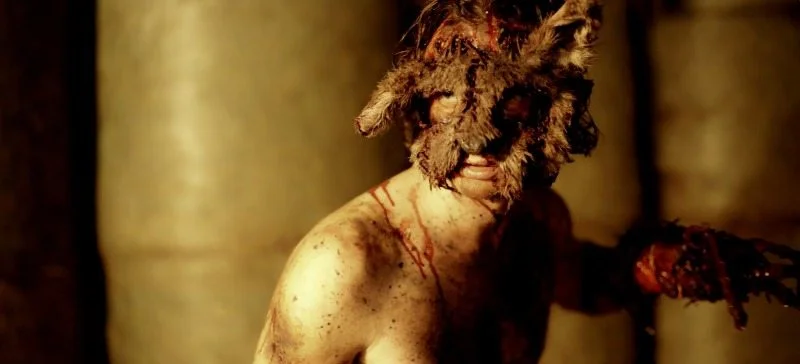[Review] Gwen is About the Horrors of Progress
Gwen opens with two girls playing in a desolate, windswept mountain range, their brief moments of joy a stark contrast to the barren, slate-filled landscape. The winds howl with menace and the peaks in the distance are snow-kissed. It’s 1855 in a mountainous region of Wales, a time where agrarian life is starting to be overtaken by more industrial-minded businessmen.
The two girls are Gwen (Eleanor Worthinton-Cox) and Mari (Jodi Innes), who live on the outskirts of a quarry with their mother Elen (Maxine Peake). Theirs is only one of a few farms left, as the land continues to get eaten up by the lucrative slate mining business. It’s a dire situation, heralded by a shot of the local doctor Wren (Kobna Holdbrook-Smith) and his crew dragging bodies from a small farmhouse. Cholera, he says. The whole family is gone.
At dinner, Gwen prays for the safe return of her father who is off fighting for the army while her mother looks on, her face as expressionlessly harsh and craggy as the mountains they live in. “This is burnt…you’ve ruined our supper,” Elen snaps at her. It hasn’t always been like this. We get a brief glimpse of their life when Gwen’s father was home and Elen’s now-guarded-face was lit with a bright smile. But those days are long gone. Later, in bed, Mari looks at Gwen and says, “I miss dad.”
“Me, too,” Gwen replies softly.
Their meager days are filled tending the small farm; goat herding and chicken-tending. Sundays are for the Lord and their small pilgrimage to the town’s church provides the only respite from work. But even here, they’re preached to about damnations. A harsh world begets harsh religion. After they leave church, Elen is stopped by Mr. Wynne (Mark Lewis Jones), the owner of the slate quarry who, with his black leather gloves and top hat, would feel right at home on the foggy streets of Jack the Ripper’s London. And while their words are silenced by the roaring and whistling wind, the looks they give each other bleed malice.
They get home only to find a heart nailed to their door.
It’s an omen of bad times that get increasingly worse as the crops turn to rotten mush, their animals are slaughtered and Gwen awakens in the middle of the night to some presence lingering just outside their house. Then Elen gets sick and falls into seizures, leaving Gwen in the precarious position of trying to keep her small family together.
Writer/director William McGregor is mostly known for his work in television, including episodes of Poldark and Misfits. Gwen is his debut film; an assured start, deeply unsettling and bleak. If you really wanted to torture yourself, it would make a great, soul-destroying double feature with another depressing debut film called Hagazussa. Both films trade in a dark, slow horror that creeps on you in waves and feels more grounded in reality than you’d expect.
Like that film, Gwen will probably be accused of not being a horror film, but McGregor understands the genre and uses it to great effect. Cinematographer Adam Etherington drenches the film in dark spaces and shadows, capitalizing on the already moody and Gothic atmosphere of the mountains. Meanwhile, the meager village looks birthed from the very mountains, with its stone and uncomfortable design.
It might be a cliché, but it’s true. The location is its own character. The constant presence of the wind and the eerie mist that sweeps through at night keeps the viewer unsettled. Thunder and lightning explode, filling the night with brightness and loud deafening booms. Meanwhile, the slate quarry lurks constantly in the background, an omnipresent threat of the future that awaits them; one that’s turning from agricultural exports to the more profitable mining operations. It’s here that McGregor turns his attention, not on supernatural horrors but something more quietly insidious: progress.
“Steal a mountain and they’ll make you a lord,” Elen says at one point.
As the narrative tightens the noose around the little family and Gwen is forced to take matters into her own hands, the script lays bare the institutions that are supposed to help protect her. She’s put her faith in her parents to shelter her. In the church and God to protect them from the devils. And in science and medicine to keep them safe from disease. But what happens when those systems are in place not to help, but to destroy?
As they say, you can’t stand in the way of progress.


![[Review] Gwen is About the Horrors of Progress](https://images.squarespace-cdn.com/content/v1/5b39608d75f9eef54c62c3f0/1571189141075-5CZDAU9Y7YJQ1SKIMCWS/gwen-poster.jpeg)



![[Review] Little Monsters Wants You to Shake, Shake, Shake It Off](https://images.squarespace-cdn.com/content/v1/5b39608d75f9eef54c62c3f0/1571083935357-D1GGOJKX7ZE8CRC1FW18/LITTLE_MONSTERS_poster.jpg)
![[Review] The Nightshifter (Morto Não Fala)](https://images.squarespace-cdn.com/content/v1/5b39608d75f9eef54c62c3f0/1558297333068-0335O6XWB2QKCCDD1P5N/OkVAA6K6.jpeg)
![[Review] The Furies is a Lean and Mean Tale of Revenge](https://images.squarespace-cdn.com/content/v1/5b39608d75f9eef54c62c3f0/1570059431293-X4Q0QYUZHRBU7U6TKPRA/2E2vNFKI.jpeg)
![[Review] The Pool is About a Boy and His Dog...and an Angry Crocodile](https://images.squarespace-cdn.com/content/v1/5b39608d75f9eef54c62c3f0/1595261147411-EMLYCSTSZ8F9RD8LZFZ5/MV5BYzRlYzJlZTktNjY1NC00NGZmLThjYzQtOGUyMWZmZWFkZWUxXkEyXkFqcGdeQXVyMTQxNzMzNDI%40._V1_SY1000_CR0%2C0%2C699%2C1000_AL_.jpg)